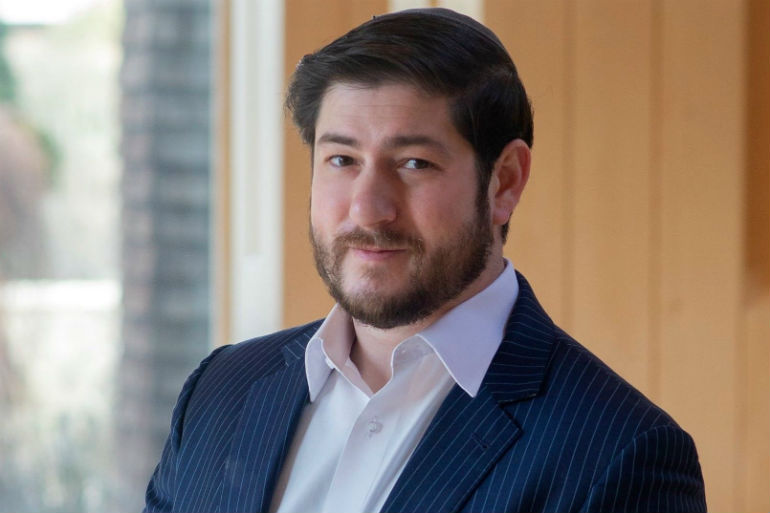Rabbi Josh Franklin Talks the Next Generation of Judaism

The Jewish Center of the Hamptons (JCOH) in East Hampton is, as Rabbi Josh Franklin calls it, “post-denominational.” Rather than shoehorn themselves into labels like Reform, Conservative or Orthodox, the JCOH promotes inclusivity among the Jewish community and hopes that everyone will feel comfortable and find a place there. For Franklin, community is a vital part of being Jewish.
“I’m actually in my third summer now in the Jewish Center of the Hamptons,” Franklin says. “Some people still call me the ‘new’ rabbi but I’m finally starting to feel less new and more like I’m finally finding my feet. I came here after serving for four years as a rabbi in Massachusetts, where I was one of four rabbis at a large congregation.” While JCOH has a smaller congregation than at his last temple, Franklin still finds that there’s an active and lively community in East Hampton. “It’s still a pretty significant place where there’s a lot of things happening and there’s a lot of fun events and programming,” he says.
Franklin grew up in Yonkers and had a strong Jewish upbringing, being the son of a rabbi. I always say I’m a rabbi despite my dad being a rabbi. It’s difficult being a rabbi’s son. I don’t think I’m alone in that,” he says. “I traveled to Israel and studied abroad for a summer, taught at a local religious school, and before I knew it I really started immersing myself in Judaism in ways that were beyond academics, beyond going to synagogue and becoming involved in college Hillel. I wanted to make an impact in the Jewish community. I wanted to do more than academia. I wanted to lead a community and help shape Judaism for the next generation.”
But how does one go about courting the next generation of congregants, when as a society people are drifting further away from organized religion? “I think Judaism is an amazing product that often has bad packaging,” Franklin says. “It’s kind of like Apple, in some ways, in the ’90s, where people said, ‘It’s a great product,’ but nobody was buying Apple. By that I mean people say, it’s a religion and millennials and younger Jews just aren’t into religion right now. But it’s more than just religion—it has cultural implications, it’s a place where you find community, it’s a place that helps you answer some of life’s deepest questions, it’s a spiritual center, it’s where you learn about things that are beyond the mundane. A synagogue is a place where people go to find meaning in their life and also to better the community around them and build community and relationships with each other.”
A large part of community is inclusivity, and Franklin is proud of JCOH in that respect. “We just celebrated Pride,” he says. “Hanging outside the center was a giant Pride flag with a Star of David in the middle. That was more than just a symbol; it also reflected programming throughout the week.” At JCOH’s weekly Thursday Night Salon series, journalist Michael Musto spoke with out Rabbi Lyle Rothman about being gay in today’s world, as well as what it means to be a gay Jew. “We hung our Pride flag out on the beach during Shabbat on the Beach, and on Saturday morning I gave a sermon that was about making sure that the fringes of our community have a place and feel a sense of comfort in the community. We consider ourselves a community that’s open to people regardless of race, gender, sexual orientation, people with disabilities—we want to be as inclusive as possible.”
The Thursday Night Salon series is just one of JCOH’s unique and dynamic programs that are offered throughout the summer. “When people come out to the Hamptons, there’s only so much of the beach or pool beyond going out to a party,” Franklin says with a laugh. “We want to be the place where people can come for intellectual conversation or programs, where they can come to find spirituality. They might go to yoga or SoulCycle in the morning then join us for Shabbat on the Beach in the evening. On top of that, we’ve been doing the Summer Institute for a number of years now, and each year we bring in different people that touch on different aspects of being Jewish. For some, that’s Israel-related, for some, that’s movies, for some, that’s learning. Every single person has different entry ways into the community.”
Franklin believes that one of the things that most sets JCOH apart from other Jewish organizations on the East End is their approach to engaging people. “It’s a Jewish experience unlike any [most] have had before. Part of it is fusing what it means to live out in the Hamptons with what it means to be Jewish,” he says. “I think the thing that people don’t know they need until they have it in this day and age is community. Very few places can offer an authentic, warm, welcoming and inclusive community. And if you come to an event at the Jewish Center of the Hamptons, if you join us for worship, that’s what you’ll find—a sense of belonging that you don’t find in too many other avenues of life. That’s something we believe impacts people and connects them deeply and roots them and we hope that whoever’s out there will come join our community and find their center with us.”
For more information on the Jewish Center of the Hamptons, 44 Woods Lane, East Hampton, visit jcoh.org.



